12 Best Home Remedies For Nose Bleeding And Prevention Tips
Nosebleeds are common, but with the right measures, they can be prevented.
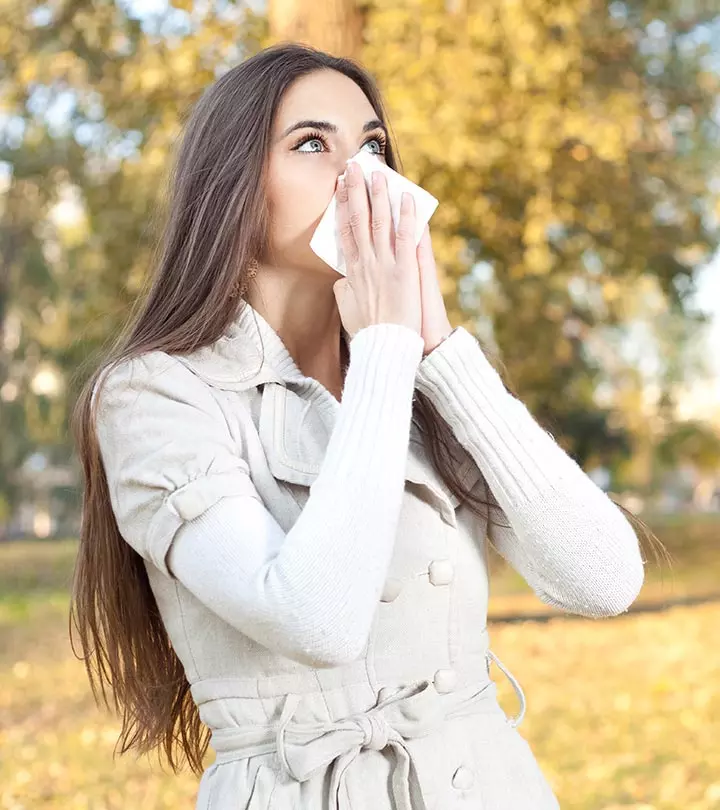
Image: ShutterStock
It is frightening to have a bleeding nose. It is not unusual for people to become tense and panic when blood is pouring down their noses. Fortunately, a few home remedies for bleeding nose work effectively and stop the bleeding.
We have got some easy techniques you can use to stop a nosebleed. So, you can take a deep breath and tell yourself, “It’s just a little blood. Not a huge deal!” However, before you attempt to do so, it is important you correctly identify what has caused it. This article discusses the different types of nosebleeds, why they occur, and simple self-care tricks you can adopt to stop them. Scroll down to know more!
In This Article
What Can Cause Nosebleeds?
A bleeding nose can be caused due to various reasons, such as excessive sneezing or rubbing, dry winter air, injury, allergies, respiratory problems like sinusitisi An inflammatory condition where the tissues lining the sinuses (hollow cavities in the skull) become swollen and irritated. , or infections like scarlet fever, malaria, or typhoid. The tiny blood vessels in the nose can swell and rupture and cause a nosebleed, which may be a mere trickle or a continuous stream. A nosebleed can also be caused by trauma to the blood vessels in your nose, for example, from a punch (yikes!).
A study amongst the US population indicated that nose bleeds are quite common but rarely fatal. Only 4 out of 2.4 million deaths occur due to a severe case of nose bleeding. The condition is common in children aged 2-10 years and in the elderly population aged 50- 80 years. Whilst 60% of the US population have experienced an incident of nose bleeding only about 10% were serious enough to require medical treatment.
 Quick Tip
Quick TipNosebleeds can occur due to the rupture of two sets of blood vessels in your nose. This helps us to categorize nosebleeds and opt for the right treatment option. The types of nosebleeds are given below.
Key Takeaways
- Stay hydrated throughout the day to reduce the risk of nose bleeding.
- Using a cold compress on the nose may help reduce bleeding.
- You can also use essential oils, saline spray, and apple cider vinegar to control nose bleeding.
- Eat vitamin A and vitamin K-rich and green leafy vegetables to increase blood clotting and prevent nose bleeding.
Types Of Nosebleeds
A. Anterior Nosebleed –
This occurs due to the rupture of the blood vessels in the front part of the nose known as the Kesselbach’s plexus.
B. Posterior Nosebleed – The blood vessels closer to the throat are ruptured in this type of nosebleed. The bleeding usually continues for longer than 20 minutes.
Comparatively, posterior nosebleeds require medical attention more than the anterior ones as the bleeding can become heavy (1).
 Quick Tip
Quick TipHowever scary they may look, please do remember that most nosebleeds are harmless and can be easily managed by natural remedies. Given below are some pointers that will help you in stopping the nosebleed.
How To Stop A Nosebleed Naturally
- Essential Oils For Nose Bleeding
- Onion For Nose Bleeding
- Cold Compress For Nose Bleeding
- Vitamins To Prevent Nose Bleeding
- Saline Spray To Stop A Nose Bleed
- Apple Cider Vinegar For Nose Bleeding
- Cayenne Pepper For Nose Bleeding
- Goldenseal For Nose Bleeding
- Witch Hazel To Stop Nose Bleeding
- Nettle Leaf For Nose Bleeding
- Humidifier
- Vaseline
Home Remedies For Nosebleed
1. Essential Oils For Nose Bleeding
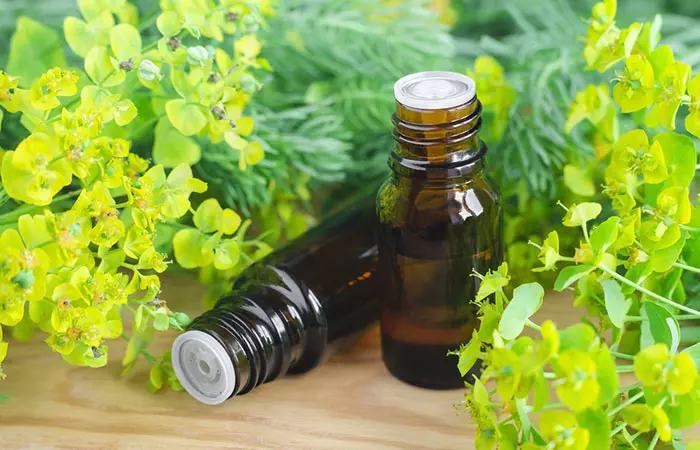
You Will Need
- 2-3 drops lavender oil OR cypress essential oil
- A cup of water
- A paper towel
What You Have To Do
- Add the essential oil to the water.
- Dip the paper towel in this mixture. Wring out the excess water and place it on the nose.
- Press gently for a couple of minutes.
If you are sure that you are not sensitive to either of these essential oils, you can directly apply a drop or two on the outer side of the bleeding nostril.
How Often You Should Do This
Doing this once for a couple of minutes should stop the bleeding.
Why This Works
Cypress oil is commonly used to treat nosebleeds and other wounds because of its astringenti A chemical or property of a substance to withdraw water and dry up secretions to tighten soft organic tissues and cells. properties that can stop the bleeding (2).
Similarly, lavender oil can be used as it encourages the healing of the ruptured blood vessels (3).
2. Onion For Nose Bleeding
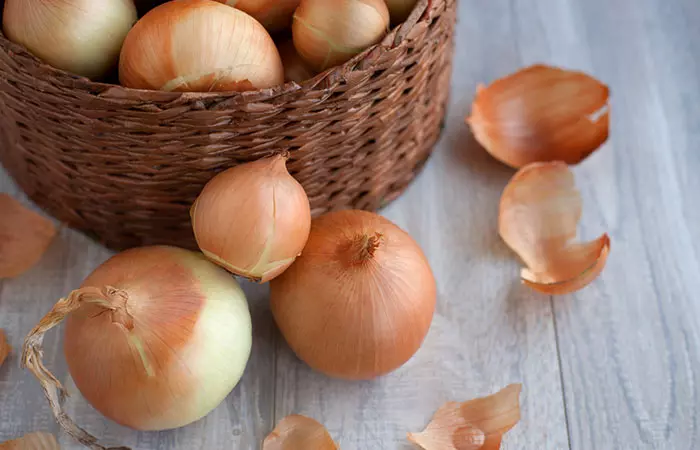
You Will Need
- 1/4 onion
- Cotton
What You Have To Do
- Grate the onion and squeeze out its juice.
- Dip the cotton ball in the juice and place it in the affected nostril for 3-4 minutes.
You can also simply place an onion slice under your nostrils and inhale its smell.
How Often You Should Do This
Use this as and when required.
Why This Works
Chinese alternative medicine practitioners swear by this remedy for stopping nosebleeds. The fumes from the onion juice will facilitate blood clotting and stop the bleeding (4).
3. Cold Compress For Nose Bleeding
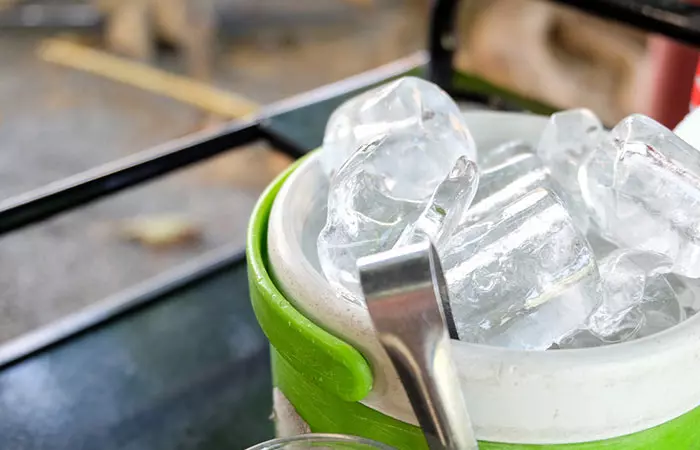
You Will Need
- A few ice cubes
- A soft towel
What You Have To Do
- Wrap the ice cubes in the towel and place it on the nose.
- Apply gentle pressure with the cold compress for 4-5 minutes.
How Often You Should Do This
Repeat after a few hours if the nosebleed persists.
Why This Works
The coldness of the ice may help shorten the time that the body takes to clot and end the bleeding (5).
4. Vitamin E
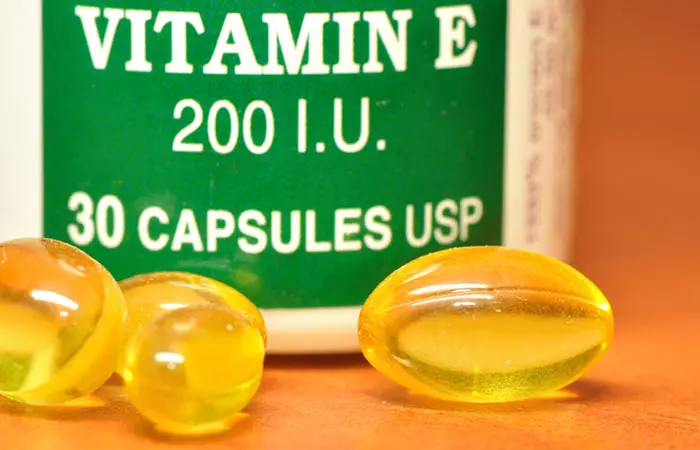
You Will Need
Vitamin E capsules
What You Have To Do
- Puncture the capsules and pour the oil present inside into a small bowl.
- Apply the oil on the inside of your nostrils.
- Leave it on overnight.
How Often You Should Do This
Repeat this every time you feel you have a dry nose.
Why This Works
During the dry winter months, you can keep your nasal membranes moisturized by applying vitamin E oil. It is very hydrating for the skin (6). This remedy works well to prevent nosebleeds.
5. Saline Spray To Stop A Nose Bleed
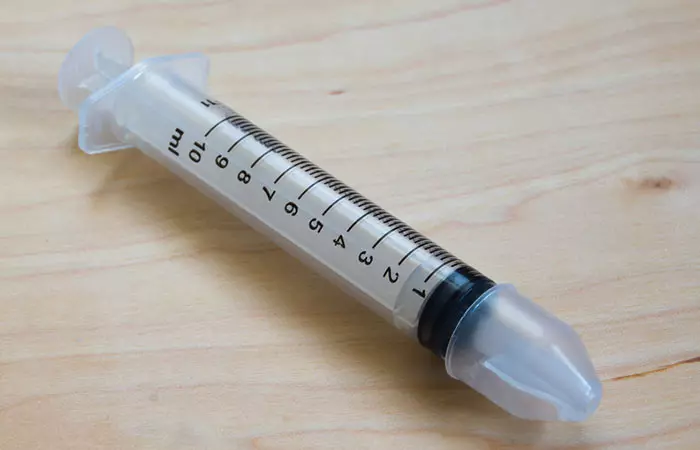
You Will Need
- 1/2 teaspoon salt
- 1/2 teaspoon baking soda
- 1 1/2 cups water
- A syringe
What You Have To Do
- Mix the salt and baking soda in the water.
- Squirt this water into one nostril using the syringe. Make sure the other nostril is closed.
- Keep your head lowered and blow out the water.
- Repeat a couple of times.
How Often You Should Do This
Do this to get rid of nasal allergies and blockages that can lead to nosebleeds.
Why This Works
Saline water helps to get rid of infections that cause excess mucus production in the nasal passages. If your nostrils are dry from the inside, the spray will help to soften the dried up mucus and expel it. If you experience frequent episodes of nosebleeding, we suggest you store the saline spray in a bottle and keep it in your first aid kit.
6. Apple Cider Vinegar For Nose Bleeding
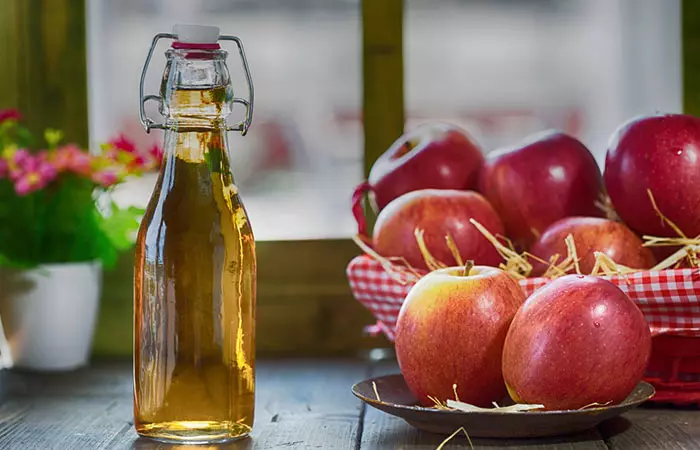
You Will Need
- 1 teaspoon apple cider vinegar OR white vinegar
- A cotton ball
What You Have To Do
Dip the cotton ball in the vinegar and place it in the affected nostril for about 8-10 minutes.
How Often You Should Do This
This remedy works well in the first attempt and stops the bleeding from your nose.
Why This Works
The acid in the vinegar helps to constrict the blood vessels, thus stopping the bleeding (7).
7. Cayenne Pepper
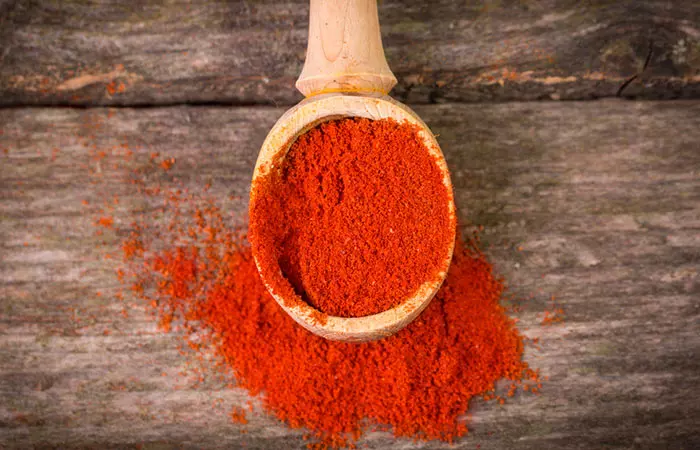
You Will Need
- 1/8-1 teaspoon cayenne pepper
- A glass of warm water
What You Have To Do
Add the pepper to water and drink it.
How Often You Should Do This
Drink this as soon as possible once the bleeding starts.
Why This Works
Cayenne pepper stimulates blood clotting and can stop bleeding (8).
8. Goldenseal
You Will Need
- A few goldenseal leaves
- A cup of hot water
What You Have To Do
- Prepare some herbal tea by steeping the leaves in hot water for a few minutes.
- Inhale the steam from this tea for 4-5 minutes.
How Often You Should Do This
Use this remedy whenever you experience a nosebleed.
Why This Works
Bleeding disorders and hemorrhagic conditions are often treated with this herb. It has antimicrobial, astringent, and hemostatic propertiesi A process of blood clotting around the wound from an injury to stop and prevent bleeding and keep the blood within the damaged blood vessels. that help it stop the nosebleed (9).
Caution
This remedy should not be used by pregnant women and lactating mothers.
9. Witch Hazel
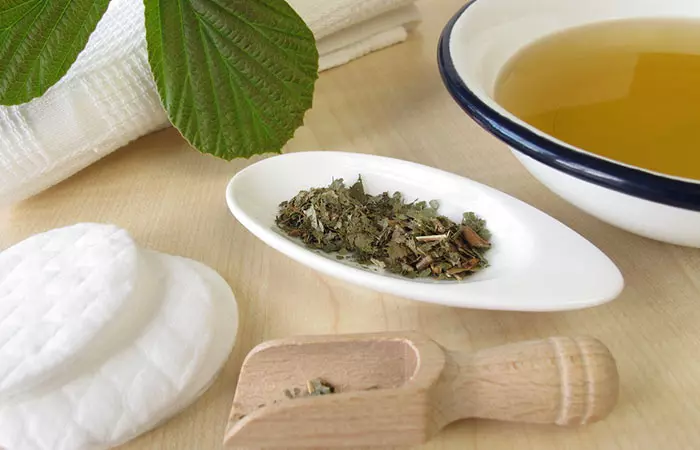
You Will Need
- Witch hazel extract
- Cotton
What You Have To Do
- Soak a piece of cotton in the witch hazel extract and place it in the nostril.
- Remove the cotton after a couple of minutes.
How Often You Should Do This
Use this remedy as and when required.
Why This Works
The astringent properties of witch hazel help to stop the bleeding (10).
10. Nettle Leaf
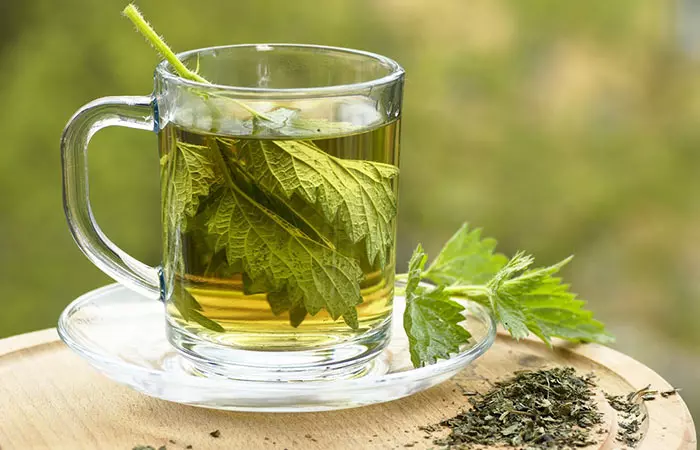
You Will Need
- 1 teaspoon nettle leaf tea
- 1 cup hot water
- Cotton pad
What You Have To Do
- Brew fresh nettle leaf tea.
- Once it has cooled down, dip the cotton pad in it and place it on the nose.
- Keep the cotton pad on for 5-10 minutes until the bleeding stops.
How Often You Should Do This
Repeat if required.
Why This Works
This herbal remedy works well for nosebleeds as nettle leaf is a natural astringent and a hemostatic agent. Also, allergy-related nosebleeds can be easily kept at bay by drinking nettle leaf tea (11).
11. Humidifier
What You Need
A humidifier
What You Have To Do
Use a humidifier.
How Often You Should Do This
Use as required.
Why This Works
Many times, nosebleeds occur due to dryness in the air, especially in winter. A humidifier will keep the surrounding air moist, thus preventing nosebleeds.
12. Vaseline
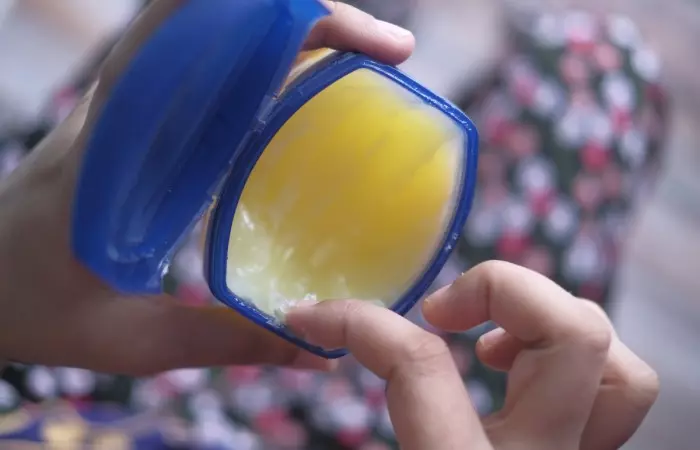
What You Need
Vaseline (petroleum jelly)
What You Have To Do
- Use a clean fingertip or a cotton swab to apply a small amount of Vaseline inside your nostrils.
How Often You Should Do This
Use as required
Why This Works
Vaseline, or petroleum jelly, may help retain moisture in the nasal passages and stop your nose from bleeding (12). However, research is limited in this regard.
Nosebleeds require simple health remedies such as the ones mentioned above. These home treatments are safe for use and will not cause any side effects. Apart from these remedies, a few other pointers can help you in dealing with a nosebleed. Read on!
Tips For Nosebleeds
A. Sit Upright
Your posture plays an important role in stopping the blood from dripping out of your nose. The first thing to do is to sit calmly in an upright position. Avoid leaning back to prevent the blood from going down the back of your throat. Breathe through your mouth, and tilt your head forward. This simple tip can easily manage minor nosebleeds. Remember to stay calm.
B. Apply Pressure
Hold either side of your nose with your thumbs and fingers, and pinch the soft part of your nose firmly for 10 minutes. This will decrease the blood flow through the affected area and aid bleeding control. Avoid exerting too much pressure as it might cause discomfort. Release the nostrils slowly after 10 minutes to check if the bleeding has stopped. Do not touch or blow your nose. If the bleeding continues unabated, try applying pressure for another 10 minutes. This tip has proven to be effective as it helps to constrict the local blood vessels.
C. Drink Plenty Of Water
A dehydrated body can also cause a nosebleed. Staying well hydrated is extremely important, especially during the dry seasons or in dry places. Dry winter air often dries out your nose, resulting in a nosebleed. So, keep your mucus membranes moist by drinking at least eight glasses of water in a day to prevent nosebleeds.
D. Apply Petroleum Jelly
Dryness can irritate the sensitive portions of the nose, which can further aggravate a bleeding nose. Applying petroleum jelly can help prevent nosebleed by combating the dryness of the nostrils. You can apply petroleum jelly on the insides of your nostrils to keep your nasal membranes moist. This remedy is particularly useful in case of nosebleeds at high altitudes or due to sinusitis or cold.
E. Vitamin C And Vitamin K
Vitamin C
is involved in the formation of collageni A protein produced in connective tissues, skin, and bone that provides structural support to the tissues to keep the skin tight. , which helps in creating a moist lining in your nose. This vitamin keeps the blood vessels in good condition, preventing them from rupturing easily (13). So, for long-term prevention, consuming vitamin C-rich foods like oranges, lemons, gooseberries, etc. is a good idea. Similarly, dark green leafy vegetables are packed with vitamin K, which facilitates blood clotting and can be useful in preventing nosebleeds (14).
Additionally, practice caution when using blood thinners as they may increase the risk of bleeding. Consult your doctor before using these (15). Also, minimize exposure to irritants like tobacco smoke and strong odors as they may aggravate the nasal passages or lead to excessive sneezing, which may cause nosebleeds.
Infographic: When To See A Doctor For Nosebleeds
A nosebleed can be scary. Though you can treat it with traditional remedies, sometimes they may not help. You must consult a doctor if the bleeding does not stop and you feel uncomfortable.
Check out the infographic to know when you should see a physician for nose bleeding treatment. Illustration: StyleCraze Design Team
Nosebleeds are scary, but most of the time, they are manageable without medical assistance if you know how to stop a nosebleed. Depending on whether you are experiencing an anterior nosebleed or a posterior (generally heavier) nosebleed, you can apply the home healing remedies to stop bleeding from the nose. Cold compress, essential oils, herbal remedies like nettle leaf, witch hazel and goldenseal, onions, apple cider vinegar, saline spray, and cayenne pepper are some home care options you can choose from. In case the remedies don’t work, or you are bleeding profusely, contact your healthcare provider immediately. However, you may also read about home remedies to stop bleeding to have an enhanced knowledge on the subject.
Frequently Asked Questions
Side effects of nose bleeding
These include:
- Nausea
- Airway blockage
- Blood enters throat and causes a burning sensation in the stomach
Can you get a nosebleed from low blood pressure?
No, low blood pressure does not cause nosebleeds.
Can cold weather cause nosebleed?
Cold weather can dry out your nose. When you pick too hard at this dried mucus, you can easily tear the skin and rupture the blood vessels. This leads to a nosebleed.
Can allergy cause nosebleeds?
Allergy symptoms can cause the nose to dry up, and this dried up skin may become itchy and/or irritating. When you scratch or try to get rid of the dried mucus by picking at it, a nosebleed can develop.
Are nosebleeds common in pregnancy?
During pregnancy, the blood supply increases and the blood vessels expand. The delicate blood vessels can easily rupture due to this increased pressure. Hence, nosebleeds are unfortunately common during pregnancy.
What causes sudden nosebleeds in adults?
Dry and hot climate is usually the cause for a sudden nosebleed in adults.
Can High BP cause nose bleeds?
Yes. Research suggests that people with hypertension are at a greater risk of nose bleeding or epistaxis. This is because high blood pressure affects the blood vessels in the nose and might damage them (16).
Can stress cause nosebleeds?
Yes. Stress might trigger nose bleeding in people who are prone to nose bleeds. Stress may hamper the coagulation functions of blood, causing nose bleeds (17).
Can hot water stop nose bleeding?
Yes, it may stop. Nasal irrigation with hot water is an effective remedy for reducing severe nose bleeding episodes (18).
Are nosebleeds related to diabetes?
Yes. Nose bleeding is a risk factor in people with diabetes. Diabetes may harden the nasal blood vessels. As a result, they may easily crumble and lead to bleeding (19).
We hope we cleared your doubts about nosebleeds and also gave you plenty of options for nose bleeding remedies that can help control bleeding. Apart from these, you should also avoid unhealthy habits, like excessive blowing or picking your nose. Constant sneezing and sniffing can also harm the delicate nasal membranes, so if an allergy is sending you into a sneezing frenzy, seek medical treatment. Recurrent nosebleeds also require a medical check-up to identify the root cause.
Get rid of those random nosebleeds with these remedies and get relief from both the worry and the annoyance. Do you know of any other ways on how to stop a nosebleed naturally? If yes, feel free to share with us by commenting below.
Illustration: Best Home Remedies For Nose Bleeding And Prevention Tips
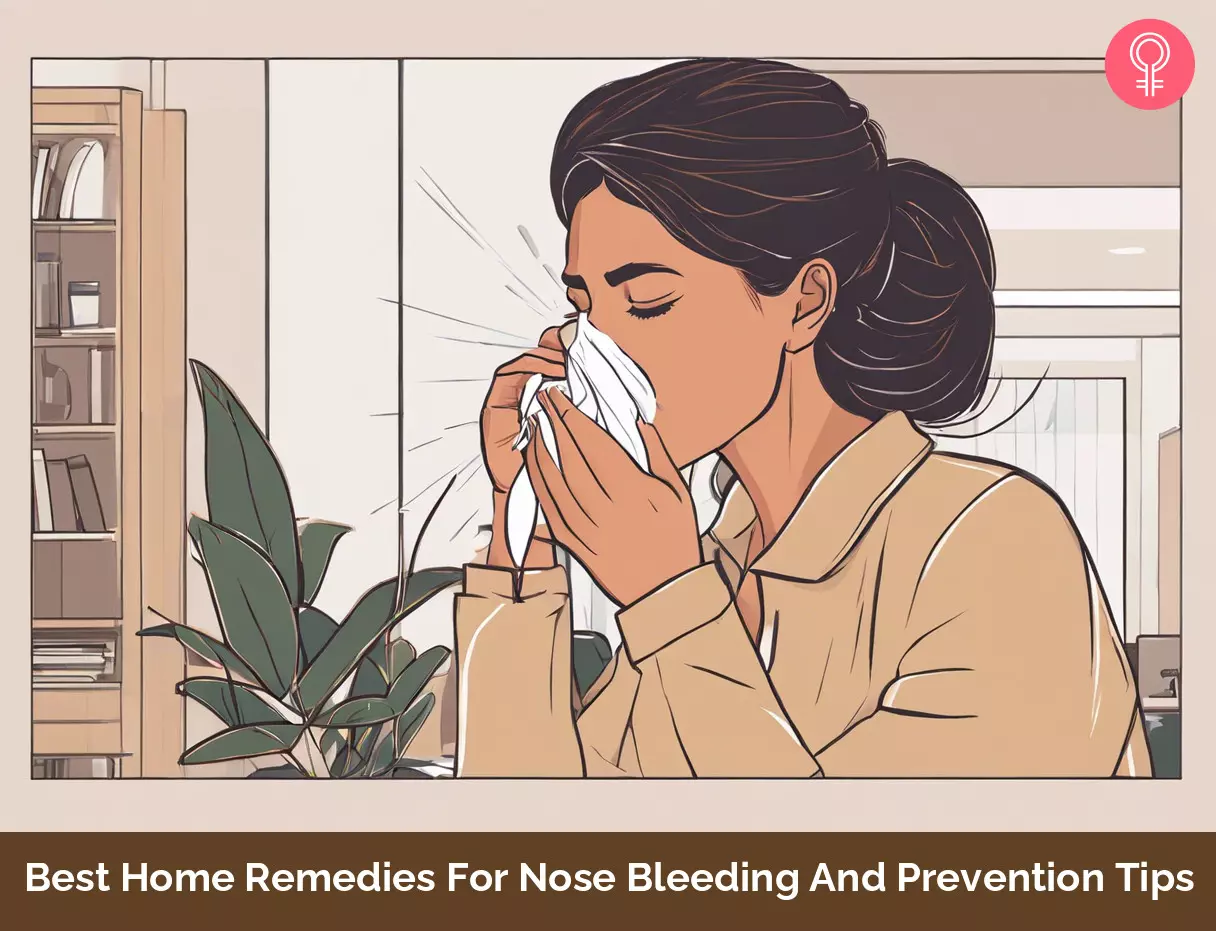
Image: Stable Diffusion/StyleCraze Design Team
Nosebleeds can be alarming, but fear not! This must-watch video reveals essential tips and step-by-step instructions on how to effectively handle nosebleeds, ensuring you’re prepared for any unexpected bleeding. Watch now to learn.
References
Articles on StyleCraze are backed by verified information from peer-reviewed and academic research papers, reputed organizations, research institutions, and medical associations to ensure accuracy and relevance. Read our editorial policy to learn more.
- Nosebleed
https://www.nhs.uk/conditions/nosebleed/ - Bioactive compounds, pharmacological actions and pharmacokinetics of Cupressus sempervirens
https://www.ncbi.nlm.nih.gov/pmc/articles/PMC9898348/ - Wound healing potential of lavender oil by acceleration of granulation and wound contraction through induction of TGF-β in a rat model
https://www.ncbi.nlm.nih.gov/pmc/articles/PMC4880962/ - The effects of Allium cepa L. (onion) and its active constituents on metabolic syndrome: A review
https://www.ncbi.nlm.nih.gov/pmc/articles/PMC7894628/ - Use of Cryotherapy for Managing Epistaxis in the First Aid Setting: A Scoping Review
https://www.ncbi.nlm.nih.gov/pmc/articles/PMC8174396/ - Influence of vitamin E acetate on stratum corneum hydration
https://pubmed.ncbi.nlm.nih.gov/9706379/ - Effects of Heating and Acidic Solutions of Vinegar and Oxymel on Milk Coagulation for Identification and Quantification of Resulting α-Lactalbumin and β-Lactoglobulin Proteins in the Final Whey Product
https://www.researchgate.net/publication/275467085_Effects_of_Heating_and_Acidic_Solutions_of_Vinegar_and_Oxymel_on_Milk_Coagulation_for_Identification_and_Quantification_of_Resulting_a-Lactalbumin_and_b-Lactoglobulin_Proteins_in_the_Final_Whey_Produc - A Scientific review on clot dissolving activity of cayenne pepper
https://www.researchgate.net/publication/325597241_A_Scientific_review_on_clot_dissolving_activity_of_cayenne_pepper - Goldenseal (Hydrastis canadensis L.) and Two of Its Constituent Alkaloids
https://ntp.niehs.nih.gov/sites/default/files/ntp/htdocs/chem_background/exsumpdf/goldenseal_508.pdf - Antioxidant and potential anti-inflammatory activity of extracts and formulations of white tea, rose, and witch hazel on primary human dermal fibroblast cells
https://www.ncbi.nlm.nih.gov/pmc/articles/PMC3214789/ - Exploring the urtica dioica leaves hemostatic and wound-healing potential
https://www.ncbi.nlm.nih.gov/pmc/articles/PMC5672119/ - A prospective, single-blind, randomized controlled trial of petroleum jelly/Vaseline for recurrent paediatric epistaxis
https://www.researchgate.net/publication/8564158_A_prospective_single-blind_randomized_controlled_trial_of_petroleum_jellyVaseline_for_recurrent_paediatric_epistaxis - Vitamin C in dermatology
https://www.ncbi.nlm.nih.gov/pmc/articles/PMC3673383/ - Topical vitamin K1 promotes repair of full thickness wound in rat
https://www.ncbi.nlm.nih.gov/pmc/articles/PMC4118534/ - Risk Factors and Management for Epistaxis in a Hospitalized Adult Sample
https://www.ncbi.nlm.nih.gov/pmc/articles/PMC9448657/ - Association of Hypertension With the Risk and Severity of Epistaxis
https://jamanetwork.com/journals/jamaotolaryngology/fullarticle/2770570 - Evidence for stress-induced bleeding in a patient with von willebrand factor deficiency
https://www.ncbi.nlm.nih.gov/pmc/articles/PMC5968656/ - Hot Water Irrigation in Posterior Epistaxis
https://clinicaltrials.gov/study/NCT04151888 - Risk factors for recurrent spontaneous epistaxis
https://pubmed.ncbi.nlm.nih.gov/25458126/
Read full bio of Dr. Abby Kramer
Read full bio of Kushneet Kukreja
Read full bio of Arshiya Syeda
Read full bio of Dipti Sharma








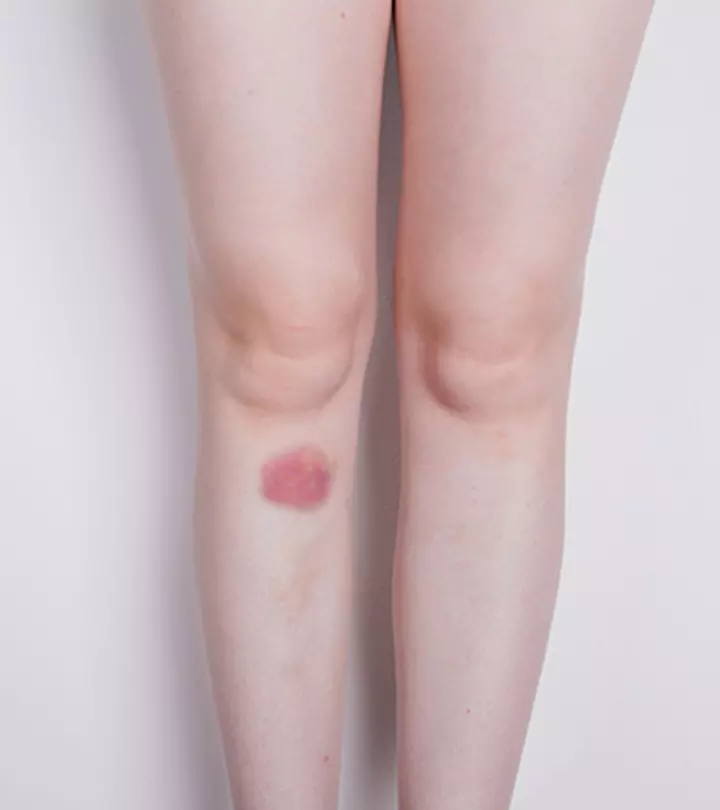
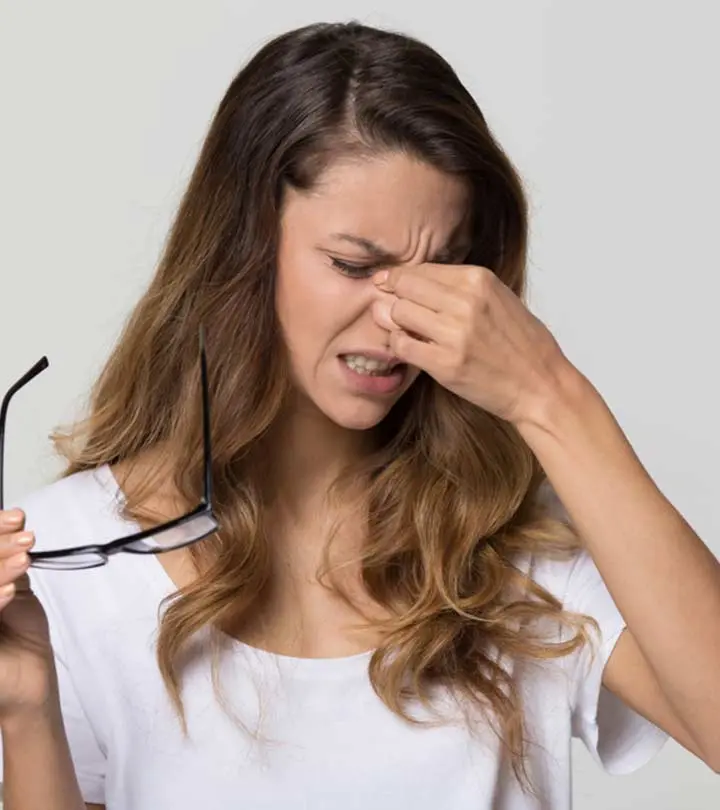



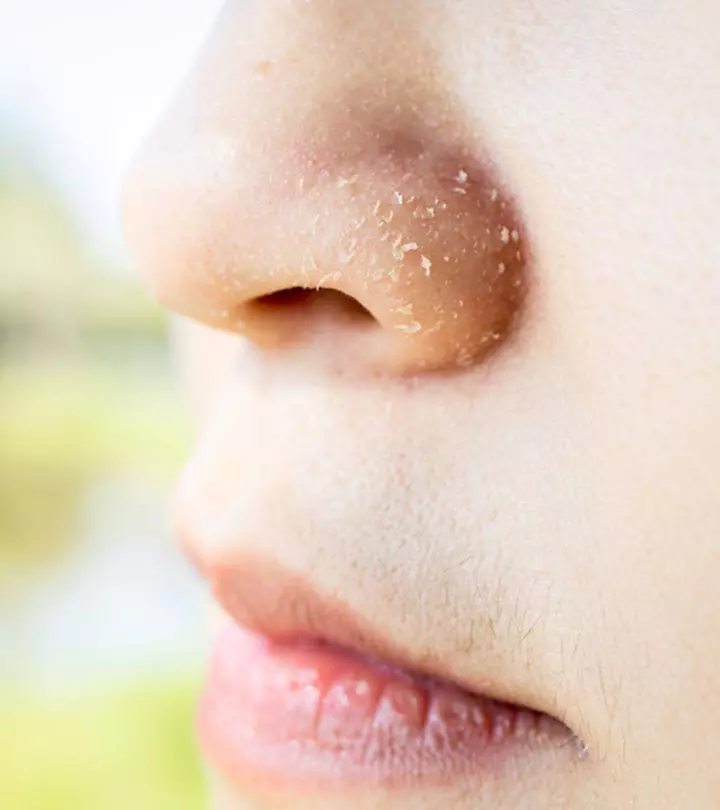



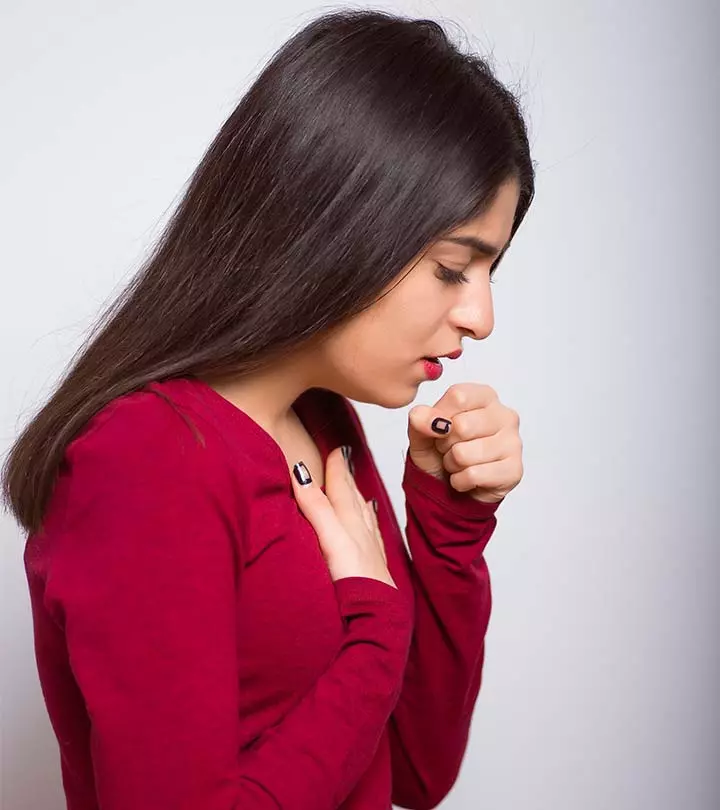
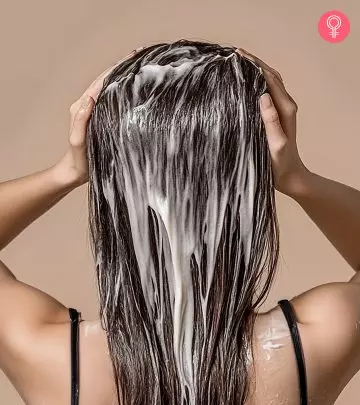




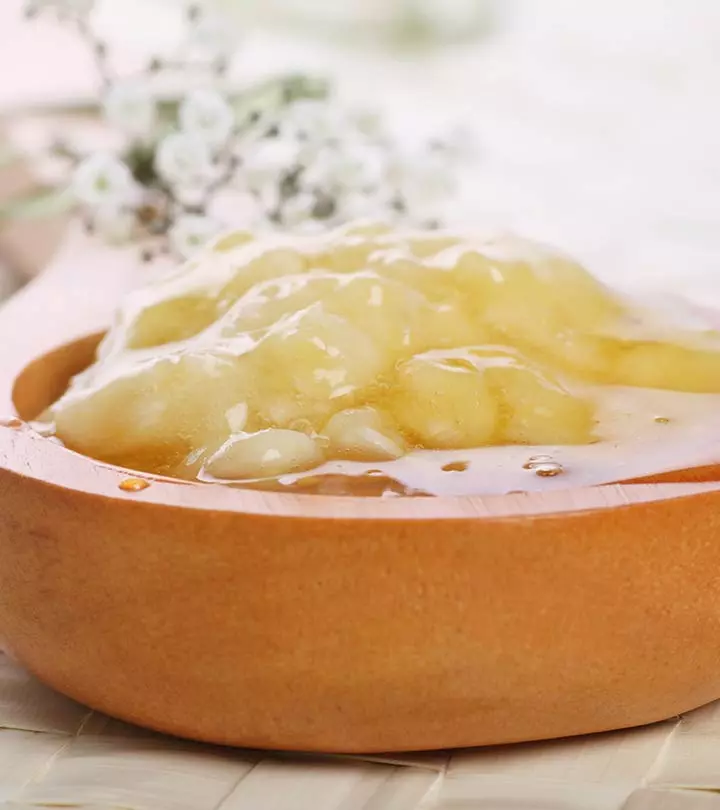
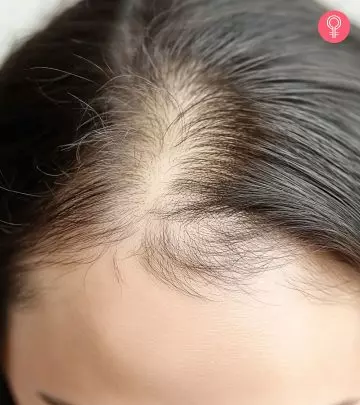
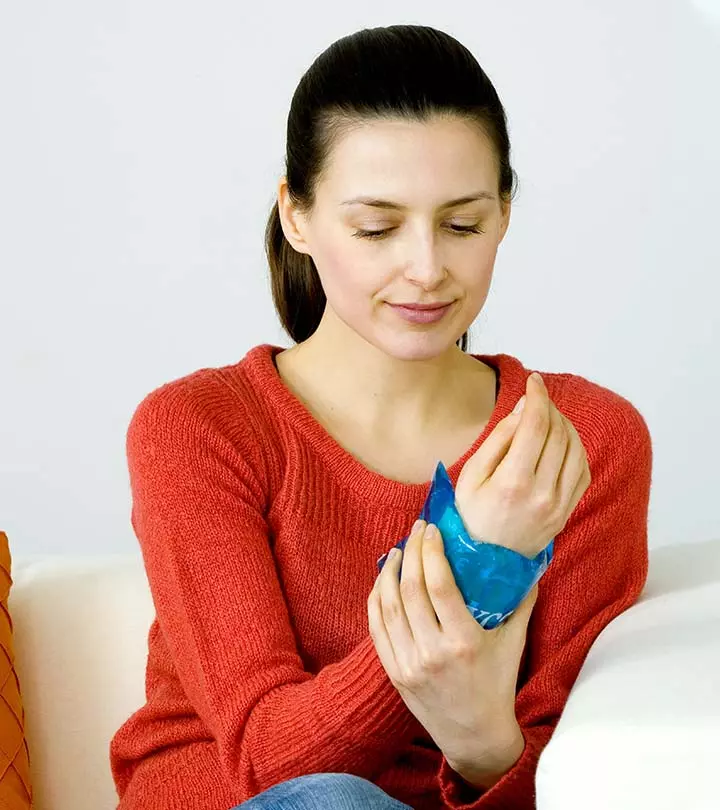
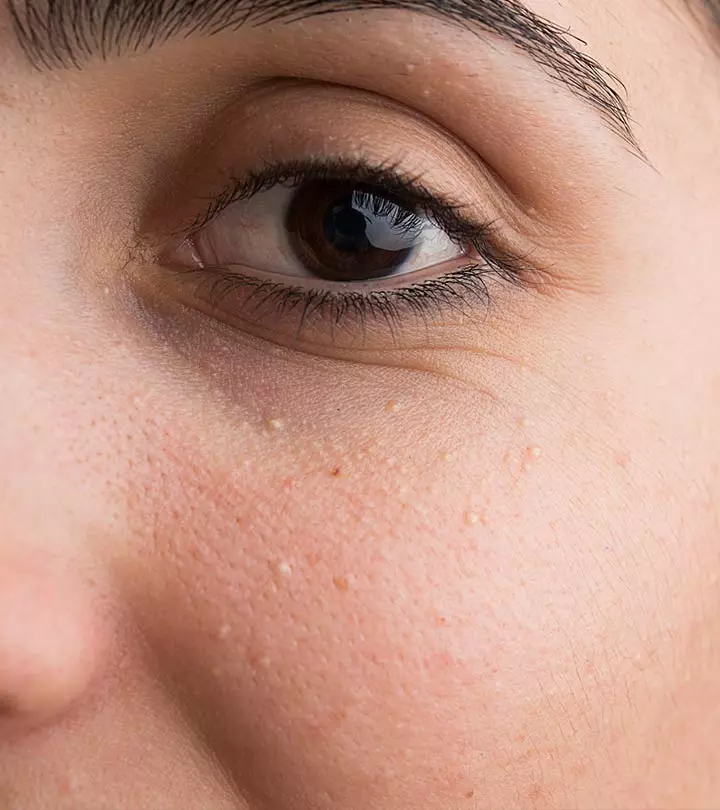
Community Experiences
Join the conversation and become a part of our empowering community! Share your stories, experiences, and insights to connect with other beauty, lifestyle, and health enthusiasts.